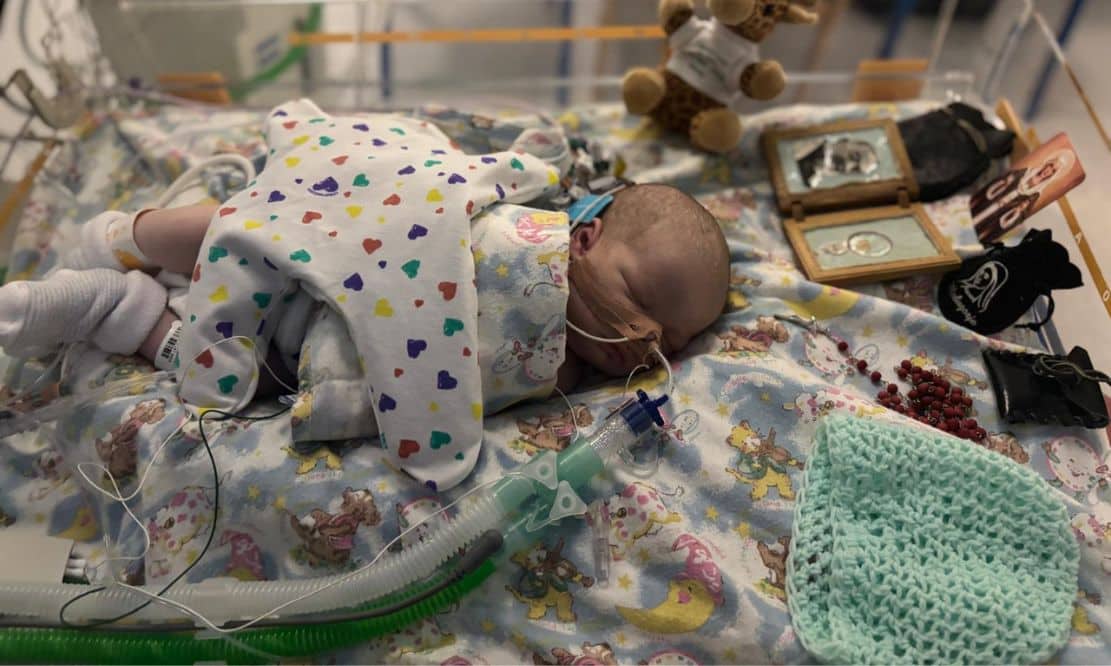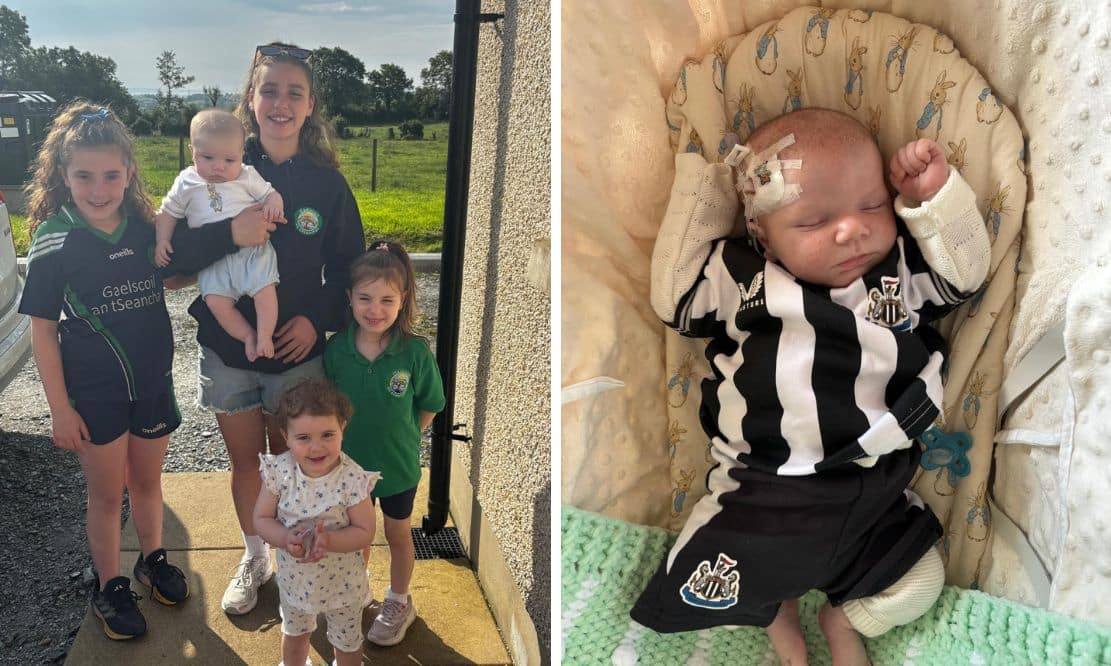
An Armagh mother-of-five is campaigning for improved Group B Strep awareness after her new-born son, Seamus had to be placed in an induced coma when he contracted Group B Meningitis which was passed to him during her labour.
Just 18 weeks ago Eimear Mitchell – who now lives near Moneymore – introduced her fifth child, Seamus to the world.
As a mother to four healthy girls, Eimear was delighted to finally have a baby boy in the family. His birth should have been a joyous occasion. But sadly, it was marred by incredible – but avoidable – trauma.
Frustratingly, there had been signs that all was not well. But Eimear argues that the medical professionals she placed her faith in “didn’t do the testing.”
The first she heard of Group B Strep was when she was 12 weeks pregnant – not with any of her first four children – but with Seamus.
A midwife had asked her if she had ever had the common streptococcal bacteria but she was unsure if she had. Knowing her history of having previously birthed four children, she said they told her she “would be fine”.
Today – armed with the information she has gathered through research – Eimear said that’s not the case.
Speaking to Armagh I, she explained: “It can come and go. You can’t assume that because someone has not had an issue in a previous pregnancy that they don’t carry it.
“Even after 35 weeks I had all the symptoms and was in Antrim hospital numerous times and they failed to test.
“Even when I was in labour, I was septic and they failed to do testing on the baby and there were signs of infection in me and him and neither of us were given an antibiotic at the time.”

Left Seamus with his sisters and right, with a plaster covering where a cannula had been inserted into his head
The symptoms that Eimear refers to were a high foetal heartrate, pain on examination around her stomach and abnormal discharge. She said she brought all of these issues to the attention of doctors and midwives but still no test for Step B was ever conducted, instead she was constantly reassured and sent home.
Fast forwarding to her labour, Eimear describes a whirlwind and traumatising experience: “When I went down [to hospital] I had a temperature and they said they were going to induce me because they thought I had an infection.
“The whole next day his heartrate was high and they were giving me paracetamol but no one was doing anything they were just getting me to move to get his heart rate down.
“My water broke at around 4.30pm or 5pm and that’s when the infection moves into the baby. At 7.30pm they took me into the delivery suite but my contractions had stopped and my temperature skyrocketed.
“I was really septic on the bed and his [Seamus] heart rate was going up and they told me he was becoming non-viable and it had to be an emergency section.
“When he was born they told me my womb was really hot which indicated a sign of infection and that they would give both me and him an antibiotic but they never did.”
It was not the birth she had envisioned but Seamus seemed to be well considering everything. They got home to their family quite quickly and the first week was as you would expect with a new-born.
However, on day eight – the night after she had posted on Facebook happily introducing her son to her wider circle – everything changed.
Said Eimear: “He fed that morning but he wouldn’t feed again in the afternoon. I just knew something was wrong. I gave him until 1.30pm and phoned the midwives but I couldn’t get through.
“Luckily enough my health visitor had text me that morning so I text her back saying, ʼI just don’t think he’s too wellʼ. My kids had a bug and I was thinking he had it too but his heart was beating really fast so they got me an appointment at 3.45pm and by 4.30pm we were in the back of an ambulance.”
They were “blue-lighted” to Antrim Hospital where Seamus was placed in an induced coma.
While in the coma, Eimear said she asked a consultant if her precious baby boy could die. She said the consultant simply looked her in the eyes and said, “Yes”.
Thankfully, however, he pulled through and is on the road to recovery – but there are still many unknowns at this stage.
“It was Group B Strep that transformed into Meningitis and he ended up with a massive bleed on the brain on one side and another on the other side,” said Eimear.
“We are lucky he’s come through it but after everything he now has had to go for sight tests and there’s still a wonder whether he will be able to walk and he has to go for a hearing test now.
“He has to go for physio every three months and he took seizures so he’s on anti-epileptic medication and I don’t know now if he’s going to be on that for the rest of his life.”
Eimear now understands that Group B Strep had been passed to her son when her waters broke during delivery. The antibiotic she said they were both due to get – but didn’t – in hospital following her section would have prevented the bacteria from progressing into Meningitis. The test she could have been offered in week 35 of her pregnancy – but wasn’t – could have detected the bacteria and allowed professionals to ensure the administration of that antibiotic.
Today, Eimear says she has been diagnosed with Post Traumatic Stress Disorder as a result of her ordeal. She blamed herself for putting her infant son through such hardship, but she now knows that it is not her fault.
While she says she has asked for a debrief with Antrim Hospital to find out why the antibiotic was not administered, Eimear’s primary focus is now on raising awareness for Group B Strep and campaigning for optional testing to become available through the NHS.
She said the test costs approximately £12 to the NHS but that it is also available privately at an average cost of £50 to expectant mothers. Both tests, she says, should be taken after 35 weeks to ensure a “proper” positive or negative result.
Ultimately, she argues that even a poster would do!
“I think even a poster or a leaflet in a waiting room would let people know how serious this is,” she said. “I have been speaking to people in Ireland and Australia who have both said that the testing is done routinely for all mothers. I’s just not done in the UK.
“Group B Strep effects an average of 1 in 4 people. Even if it was offered optionally so that you could make the decision to take the test yourself and pay for it? I just think something needs to be done.”
A spokesperson for the Northern Trust said: “We are committed to giving every baby in our care the best possible start in life and we very much regret what baby Seamus has been through since his birth.
“We acknowledge the ongoing anxiety and distress this has caused to his mum and wider family.
“Patient feedback is a crucial part of our commitment to ongoing learning and we would welcome an opportunity to speak directly with Ms Mitchell as part of this mutual approach to service improvements.
“It is important to note that in line with all other HSC Trusts in Northern Ireland, the Northern Trust follows the guidance of the National Screening Committee which does not recommend universal bacteriological screening of Group B Streptococcus (GBS).
“Instead, a risk-based approach is taken within the UK. If a woman has tested positive for GBS in a previous pregnancy, we offer testing at 35-37 weeks or 3-5 weeks prior to anticipated delivery date if earlier. Antibiotics during labour may be prescribed in accordance with the Royal College of Obstetricians and Gynaecologists (RCOG) ‘Pathway of Care’.
“At booking for pregnancy, all women are provided with the RCOG information resource ‘Group B Streptococcus (GBS) in pregnancy and new-born babies.”
The National Screening Committee’s view is that there is no clear evidence to show that testing for GBS routinely would do more good than harm. The reasons quoted are:
· Many women carry the bacteria (GBS is present in 20-40% of adults) and, in the majority of cases, their babies are born safely and without developing an infection.
· Screening women late in pregnancy cannot accurately predict which babies will develop GBS infection.
· No screening test is entirely accurate. Between 17% and 25% of women who have a positive swab at 35-37 weeks of gestation will be GBS negative at time of birth of their baby. Between 5% and 7% of women who are GBS negative at 35-37 weeks of gestation will be GBS positive at delivery.
· In addition, many of the babies who are severely affected from GBS infection are born prematurely, before the suggested time for screening.
· Giving all carriers of GBS antibiotics would mean that a very large number of women would receive treatment they do not need; this may increase adverse outcomes to mother and baby.




